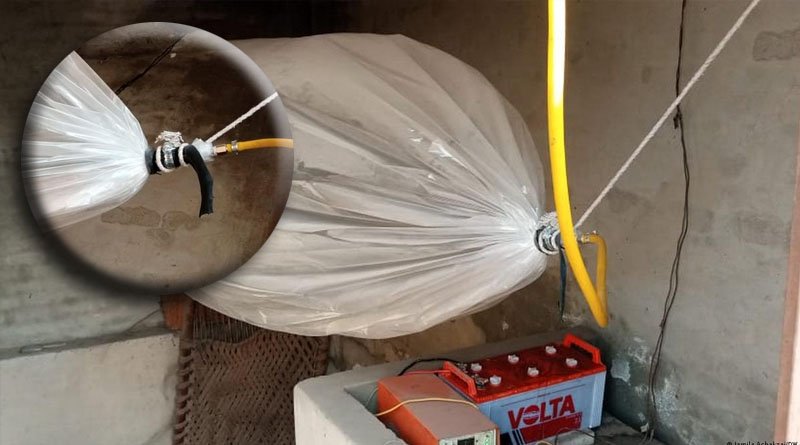Using plastic bags to store gas has recently come under increased pressure from the authorities. The populace has outlawed the practice, declaring it a safety threat.

Plastic bags are being used more frequently in Pakistan to store gas, but this practise is extremely risky and endangers both people’s lives and their property.
Masooma Bibi, a middle-aged housewife from Pakistan’s Khyber Pakhtunkhwa province, resides in a deplorable area of Charsadda district. She used to cook with firewood until two years ago, which releases unhealthy levels of noxious gases and particulates that have an adverse effect on the respiratory system.
However, she now relies on gas that is kept in large, makeshift plastic bags.
The bags are filled with natural gas at stores that are connected to the nation’s gas pipeline network and have nozzles and valves fixed securely. They are then sold to customers, who use a small electric suction pump to use the gas later.
For the purpose of filling the plastic bag and supplying the gas from the bag to the kitchen, a compressor is required. One user claims that it takes an hour to fill the bag. Although the use of such bags for gas storage is expanding, it is also very risky and endangers both people’s lives and their property.
“There are warnings that these plastic bags could result in gas explosions, but first, I haven’t heard of any such incident, and second, even if these fears are accurate, poor people like myself have no other option because cylinders are so expensive,” she said.
In Pakistan, natural gas is one of the most affordable fuel options and is frequently used for heating and cooking. However, dwindling gas supplies have compelled authorities to reduce home deliveries, filling stations and industrial units.
Inflation has been stoked, and protest movements have been sparked by the lack of gas and the increased price of petroleum products. The price of gas cylinders, which are used to store and transport gas, is a problem in and of itself.
A trader named Najeebullah Khan claimed that gas cylinders, which are frequently made of carbon steel or steel alloys, cost about 10,000 Pakistani rupees ($45 or €42.3), making them out of reach for many households, businesses, and shops.
“Depending on the size, these reusable bags cost between 500 and 900 rupees ($2.3 and $4) each, while compressors cost between 1,500 and 2,000 rupees each. “They are utilised in both rural and urban areas he said.
However, using plastic bags to store gas has recently come under increased pressure from the authorities. The populace has outlawed the practice, declaring it a safety threat.
About eight patients from gas-related accidents are admitted to the Burn Care Center of the Pakistan Institute of Medical Sciences each day, according to Dr. Quratulain, a medical officer based in Islamabad. One or two of these patients are critically injured.
The majority of people hurt by cooking stove explosions are women, but people can also get burned inside from explosions caused by matches or electric sparks.
This month, Peshawar city officials detained 16 shop owners for selling these bags. A house in Peshawar has a plastic bag of natural gas loosely positioned underneath a shed.
Due to shop owners’ fear of fines and arrests following the crackdown, the business has since moved underground. Instead, they only accommodate the requests of those clients who they think won’t call the police.
The main causes of the issue, according to Yawar Abbas, a senior official at the public utility Sui Northern Gas Pipelines Limited (SNGPL) in Khyber Pakhtunkhwa, are extreme poverty and high inflation.
The same opinion is held by Peshawar resident Najma Mubeen. She refers to the arrests, fines, and store closings as “cosmetic measures.” She claimed that affordability was the root of the issue and that the only workable solution was to use inexpensive cylinders.